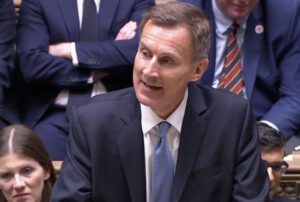Public finances hit by highest debt interest payments for any July

<?xml encoding=”utf-8″ ?????????>
Government borrowing came in lower than expected last month despite a hit from the highest debt interest payments ever seen for the month of July.
The Office for National Statistics (ONS) said the interest payable on central government debt was £7.7bn while borrowing during the month was the fifth highest for the month of July on record.
That sum came in at £4.3bn – £700m lower, however, than economists polled by the Reuters news agency had expected.
It took borrowing over the first four months of the financial year to £56.6bn, almost £14bn up on the same period in the last financial year.
The public finances – soured initially by the effects of the COVID pandemic and government support for individuals and businesses – were later harmed further by the cost of living crisis.
Last year’s energy price surge gave rise to a £40bn bill to cover off the worst of the rises in household and corporate gas and electricity costs which were mostly a consequence of Russia’s invasion of Ukraine.
Microsoft in fresh bid to get Activision Blizzard takeover past UK regulator
The Treasury has responded to the pressure on the public purse by imposing a higher tax burden – a scenario it would look to partly reverse next year ahead of a general election.
While things like VAT receipts have been boosted due to higher inflation, the effects have had a negative impact on the public purse, too.
The interest bill of £7.7bn for July is a consequence of vast swathes of government debt being linked to the RPI measure of inflation.
The continued easing of inflation in recent months should reduce those payouts in the months ahead, the ONS said.
It said the public finances were boosted by inflows of self-assessment income tax receipts which are typically strong in July.
They came in at £11.8bn – £2.5bn up on the same month last year.
Another good piece of news for the chancellor, Jeremy Hunt, is that borrowing in the financial year to date is £11.3bn less than the amount forecast by the independent Office for Budget Responsibility (OBR).
The OBR said of the figure: “The downside surprise is more than explained by higher central government receipts, reflecting stronger nominal tax bases, alongside lower borrowing by local authorities and public corporations.
“This was partly offset by higher central government spending which was £8.0bn above profile in part reflecting higher-than-forecast public sector pay awards.”
The chancellor said of the ONS figures: “As inflation slows, it’s vital that we don’t alter our course and continue to act responsibly with the public finances.
“Only by sticking to our plan will we halve inflation, grow the economy and reduce debt.”
Ruth Gregory, deputy chief UK economist at Capital Economics, signalled the data did not change its view that Mr Hunt will have limited room for pre-election giveaways.
She said: “With interest rates still rising and a mild recession on its way, we continue to think the chancellor will struggle to unveil a large package of permanent tax cuts in the Autumn Statement while still adhering to his fiscal rules.”




